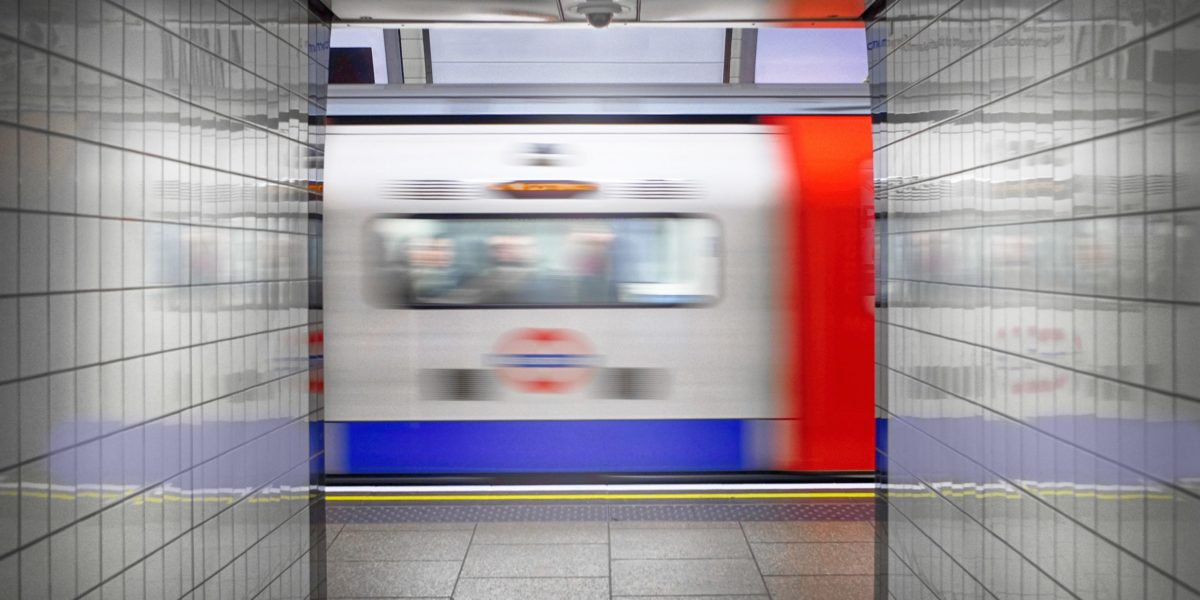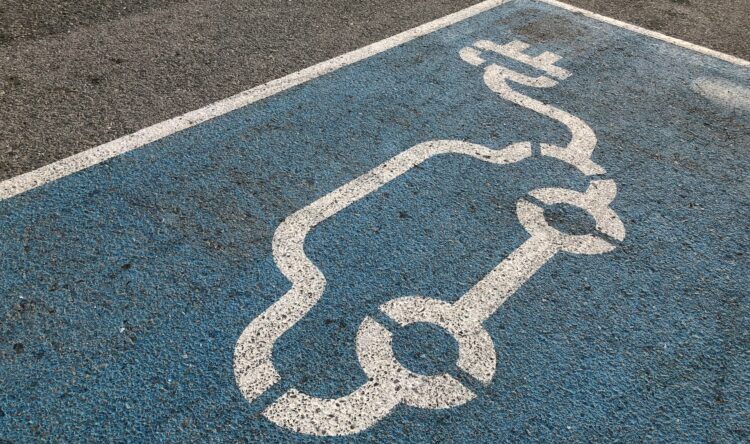UK and Ireland commuter failure
A look at the best and worst countries for commuting
The best countries for commuting
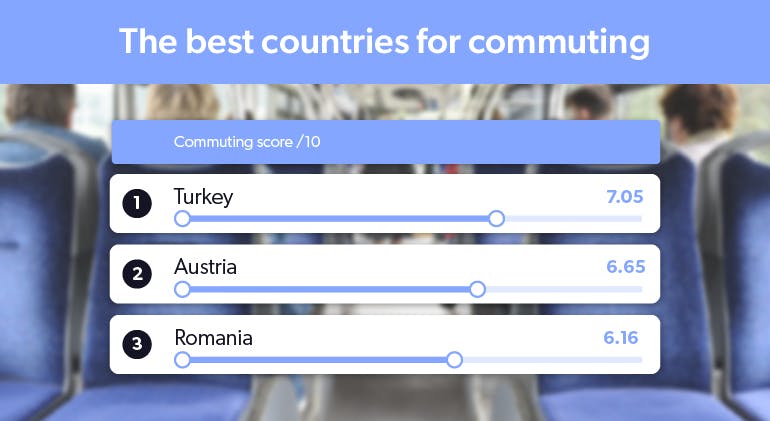
1. Turkey
Taking top spot is Turkey, largely due to the affordability of commuting in the country. Not only was Turkey the cheapest nation when it came to fuel, with an average price of just £0.66 per litre, it is also in the top five cheapest countries for public transport too. But it isn’t just affordability that Turkey excelled in; commuters are also amongst the greenest, with average emissions of 4.4 tonnes per person.
2. Austria
The second-placed comes Austria, scoring highly on environmental factors. They were also among the countries that had the lowest costs when it comes to the cost of a public transport pass, with an average monthly cost of £42.
3. Romania
In third place is Romania. It is the cheapest nation when it comes to the cost of a monthly public transport pass, averaging just £14. Emissions are also low at 3.4 tonnes per capita.
The worst countries for commuting
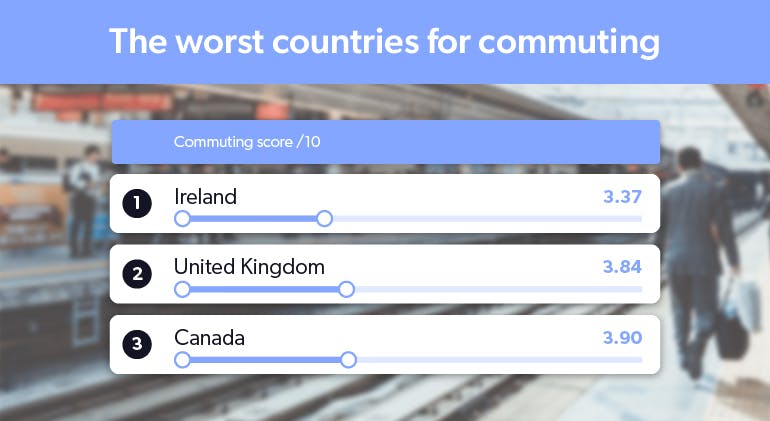
1. Ireland
Ireland is the worst country for commuters. It has the highest cost when it comes to a public transport pass, averaging £85.71 a month. In fact, Ireland scored poorly on every factor looked at, other than its CO2 emissions.
2. United Kingdom
The United Kingdom came out as the second-worst country for commuters, scoring poorly across the board. Lots of cities in the UK have light rail services such as the famous London Underground, but it seems that the cost, time taken, and even eco-friendliness of the British commute, all require some improvement.
3. Canada
Canada actually scores quite well on a couple of metrics such as, the cost of fuel per litre and cost of public transport. However it was massively let down by its CO2 emissions, actually higher than any other country we analysed, at 13.8 tonnes per capita.
The best countries for…

Fuel price: Turkey
While we’re all encouraged to walk or catch public transport to work where possible, most of us still choose to drive. Therefore, one of our biggest expenses is that of fuel. Turkey was the cheapest country when it came to filling up, paying just £0.66 per litre.

Average monthly public transport pass cost: Romania
If you do choose to take public transport to work, you’ll still have to shell out for a pass each month. The cheapest country for a monthly pass was Romania with an average monthly cost of £14.

Average commute time: Iceland
Possibly the worst aspect of the daily commute is the time it takes – stuck in traffic or being held up by signalling delays on the train. But in Iceland, the average daily commute takes just 15 minutes. Iceland’s unique geography means that almost all of the population are concentrated in coastal areas. Around 80% of the inland area is uninhabitable, so workers generally don’t have as far to commute.

Public charging stations: Norway
Given that it has the most electric vehicles, Norway also has the highest proportion of public vehicle charging stations. There are over 3,700 per million people. EVs have been common on Norwegian streets for many years now, with the impressive infrastructure playing a big part in this.

CO2 emissions: Malta
Commuting is a big part of a country’s CO2 emissions. Many are trying to drive people towards greener alternatives and Malta seems to be making the best progress. CO2 emissions of just 3 tonnes per person.
The best places for commuting in the UK
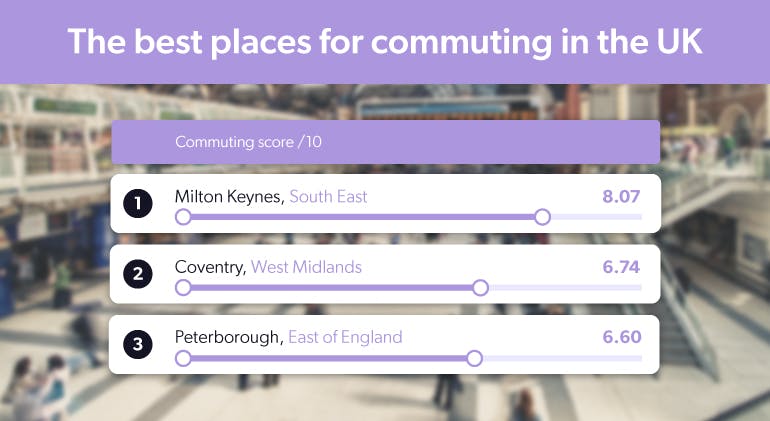
1. Milton Keynes, South East
Many commute into London, but Milton Keynes still scored highly on almost all of the factors that we looked at. It has the highest number of electric vehicle charging stations (134.7 per 100,000 people). It’s well set up for a greener commute in the years to come, and also had a short average commute of just 14.1 minutes.
2. Coventry, West Midlands
Like Milton Keynes, Coventry has a particularly robust charging network for electric vehicles. It is also amongst the cheaper towns and cities when it comes to the cost of a monthly public transport pass, averaging just £50.90. The city’s “Very Light Rail System” is set to be operational by 2024 and will make it even easier for locals to get to work.
3. Peterborough, East of England
Despite being located around 76 miles away, many people commute into London. It is ideally placed on the East Coast Main Line. Peterborough has by far the highest number of electric vehicles – 8,411 per 100,000 people. It also has one of the shortest commutes with an average of just 14.1 minutes.
The worst places for commuting in the UK
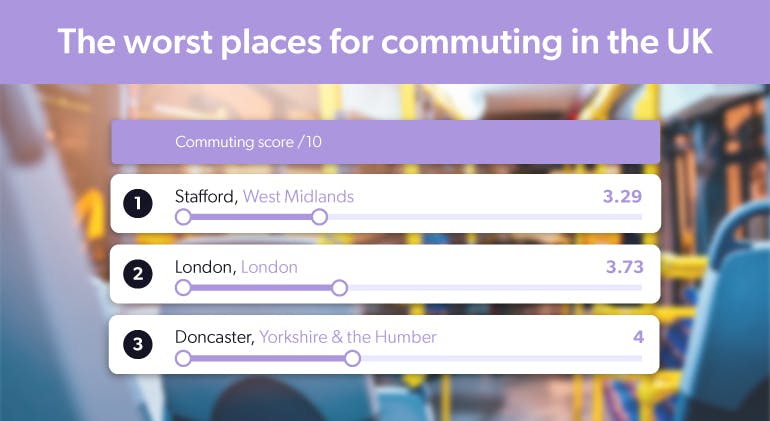
1. Stafford, West Midlands
Stafford holds the unfortunate title of the worst place to commute. While it scored okay in terms of commute cost and times, it is the green factors where the town lagged behind. There are low numbers of both electric vehicles and chargers, as well as high emissions per capita of 6.6 tCO2.
2. London, Greater London
As one of the busiest cities in the world, it’s probably no surprise to anyone London makes the top three worst places to commute. The capital isn’t just the most expensive city when it comes to public transport – a travel pass costs an average of £162 – but it’s also the city with the longest average commute. Londoners spend an average of 36.3 minutes getting into work.
3. Doncaster, Yorkshire & the Humber
Doncaster, much like Stafford, actually scores quite well in terms of the amount of time people spend commuting and the cost of doing so, but was let down in the eco-friendliness factors.
The best place in the UK for…

Average monthly public transport pass cost: Barrow-in-Furness
One of the biggest complaints that people often have with commuting is the cost, especially public transport. The town with the cheapest monthly public transport pass on average is Barrow-in-Furness, in Cumbria, at £20.

Median commuting time: Carlisle
Workers in Carlisle take an average of 12 and a half minutes to get to their place of work. The city is served by multiple rail services across the country and also has a number of local bus services too.

Electric vehicles: Peterborough
With the government looking to ban the sale of new petrol and diesel vehicles by 2030, EVs are taking priority. Peterborough leads the way, with 8,411 electric vehicles in the city per 100,000 people.

Public EV chargers: Milton Keynes
Milton Keynes leads the way when it came to the availability of public places to charge your electric vehicle, with 134.7 per 100,000 people in the town. Having a strong charging infrastructure will be key to towns and cities in the coming years.
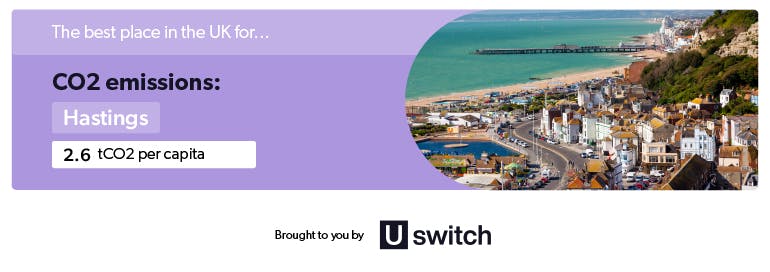
CO2 emissions: Hastings
Finally, transport is one of the biggest contributors to harmful CO2 emissions. Hastings was the place with the lowest emissions per person, with just 2.6 tonnes per person.
Changing worlds, changing time
Uswitch.com car insurance expert, Florence Codjoe comments:
“After nearly two years of lockdowns and working from home, the world is finally beginning to open up again, which means across the globe many of us are heading back into the office and having to deal with the stress of the daily commute.
“It’s interesting to see our research reveals Ireland and the United Kingdom are the two worst countries in the world for commuting. Ireland comes out as the worst, notably having the highest public transport pass cost, followed closely by the UK which scores poorly across the board – from high transport costs to a long average commute time. Turkey came out as the best country for commuting largely due to the affordability of commuting and for scoring highly on the green factors which we looked at.
“It will be interesting to see if the daily commute improves over the coming years, with more countries adopting a hybrid way of working, which in return should hopefully see the average commute time and stress of travelling, decrease in countries across the world.”
See the full research here
